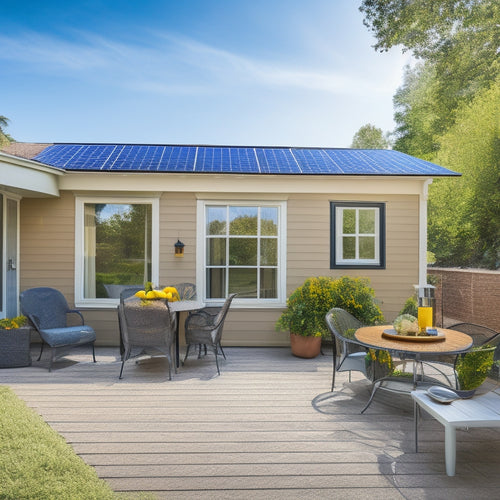
Best Solar Panel Solutions for Efficient Energy
Share
You can optimize your shift to renewable energy by leveraging state-of-the-art solar panel solutions that combine high-efficiency products, innovative technologies, and smart system design to maximize energy output and reduce waste. Top solar panel manufacturers offer high-efficiency products, bifacial designs, and proprietary processes that enhance environmental friendliness. Efficient solar panel systems require proper inverter matching, system configuration, and high system voltage to minimize energy losses. By selecting the right inverters, panels, and installation practices, you can guarantee maximum power generation from sunlight - and by exploring further, you'll uncover even more ways to release the full potential of solar energy.
Key Takeaways
- High-efficiency solar panels with unique bifacial designs and proprietary processes can increase energy output by up to 25% and reduce silicon waste.
- Proper inverter matching and system configuration, including grid-tied, micro, and string inverters, minimize energy losses and optimize energy output.
- Well-designed solar panel systems with high system voltage and low temperature coefficients ensure maximum power generation from sunlight.
- Energy storage capacity, ideally with lithium-ion batteries, should be oversized by 10-20% to accommodate unexpected usage and ensure a steady power supply.
- Advanced system monitoring and maintenance, including module-level monitoring and optimization, are crucial for identifying performance issues and maximizing energy efficiency.
Top Solar Panel Manufacturers
Three leading solar panel manufacturers stand out from the rest, dominating the market with their high-efficiency products and innovative technologies.
You'll notice that these industry leaders prioritize solar panel innovations, incorporating sustainable materials into their designs.
For instance, one manufacturer uses a unique bifacial design that increases energy output by up to 25%.
Another leader has developed a proprietary process to reduce silicon waste, making their production process more environmentally friendly.
Meanwhile, a third manufacturer has introduced a new line of panels with built-in inverters, streamlining installation and maintenance.
These advancements have enabled these top manufacturers to achieve higher efficiencies, with some panels reaching up to 22.8%.
Their commitment to innovation and sustainability has raised the bar for the entire industry, driving the adoption of renewable energy sources.
As you investigate the market for the best solar panel solutions, you'll want to contemplate these leaders and their state-of-the-art technologies.
Top Solar Inverter Technologies
As you investigate the best solar panel solutions, you'll want to reflect on the critical role inverters play in utilizing the energy generated by your solar panels.
Inverters convert DC power from your solar panels into AC power, making it usable for your home or business. With numerous inverter technologies available, selecting the right one can greatly impact your energy output.
Here are some top solar inverter technologies to evaluate:
-
Grid-Tied Inverters: These inverters synchronize with the grid, allowing you to sell excess energy back to your utility company.
-
Microinverters: With microinverters, each solar panel has its own inverter, providing greater flexibility and microinverter advantages like module-level monitoring and optimization.
-
String Inverters: These inverters are connected to a string of solar panels, offering a cost-effective solution for larger systems.
-
Power Optimizers: These devices optimize energy output at the module level, providing greater flexibility and efficiency.
-
Hybrid Inverters: These inverters combine grid-tied and battery-based systems, enabling energy storage and backup power capabilities.
Efficient Solar Panel Systems
You've likely invested in a solar panel system to reduce your energy bills and carbon footprint. To maximize your solar energy savings, it's vital to focus on efficient solar panel systems. A well-designed system guarantees peak solar panel efficiency, translating to more power generated from the same amount of sunlight.
When it comes to efficient solar panel systems, the type and quality of components matter. High-efficiency solar panels with low temperature coefficients and high fill factors can greatly enhance your energy output. Additionally, a well-matched inverter and optimized system configuration are fundamental for minimizing energy losses.
To achieve peak performance, consider a system with a high system voltage to reduce electrical losses. In addition, confirm proper system monitoring and maintenance to identify and address any performance issues promptly.
Best Solar Installation Practices
Optimizing your solar panel system's performance relies not only on its design but also on its installation. A well-planned and executed installation is vital to guarantee your system operates at its maximum capacity.
When it comes to installation, you need to take into account several factors to get it right.
Here's what you should focus on:
-
Conduct a thorough site assessment to identify potential obstacles, such as shading, structural integrity, and electrical connections.
-
Create a realistic installation timeline to avoid delays and minimize downtime.
-
Confirm your installation team is experienced and certified to handle the specific type of solar panels you're using.
-
Verify that all necessary permits and approvals are in place before commencing the installation.
-
Perform thorough quality control checks to ensure a safe and efficient connection to the grid.
Maximizing Energy Storage Capacity
Maximizing Energy Storage Capacity
Your solar panel system's energy storage capacity plays a critical role in guaranteeing a steady power supply during periods of low sunlight or at night. To maximize energy storage, you'll want to select the right battery technologies for your system. Lithium-ion batteries, for instance, offer high energy density and long lifetimes, making them a popular choice.
You should also take into account the overall system design, including the inverter and charge controller, to guarantee efficient energy transfer and minimize losses.
When sizing your energy storage system, you'll need to balance your energy needs with the available roof space and budget. A general rule of thumb is to oversize your energy storage capacity by 10-20% to account for unexpected energy usage or periods of low sunlight.
Additionally, you may want to take into account advanced energy storage systems that can optimize energy usage and reduce waste. By maximizing your energy storage capacity, you can guarantee a reliable and efficient power supply, even when the sun isn't shining.
Frequently Asked Questions
Can Solar Panels Work Efficiently in Cloudy or Shaded Areas?
You'll find that solar panels can still generate power in cloudy or shaded areas, but their performance will be reduced due to shading effects, which decrease energy output by blocking sunlight from reaching the photovoltaic cells.
How Long Does It Take to Install a Solar Panel System?
As you commence on this renewable expedition, imagine a skilled builder constructing your energy independence. You'll be generating power in no time, as the installation timeline typically ranges from a few days for small systems to several weeks for larger ones, depending on the system size.
Are Solar Panels Durable Enough to Withstand Extreme Weather?
You'll be pleased to know that solar panels are built to last, with a typical solar panel lifespan of 25-30 years, and are designed to withstand extreme weather resistance, including heavy snow, strong winds, and intense hail storms.
Can I Install Solar Panels on My Own or Diy?
You can technically install solar panels yourself with DIY solar kits, but it's recommended you don't; improper solar panel installation can lead to safety hazards, reduced efficiency, and even void your warranty, so consider hiring a professional for best results.
Are There Any Government Incentives for Solar Energy Adoption?
Ha! You think the government cares about your eco-friendly initiatives? Think again! But, yes, you'll be thrilled to know you're eligible for federal rebates and state incentives, which can cover up to 30% of your solar panel installation costs, you savvy saver, you!
Related Posts
-

10 Tips to Buy Affordable Solar Panels Online
When purchasing affordable solar panels online, you'll want to research reputable retailers, compare prices, and chec...
-

10 Tips for Cleaner City Air With Scooters
By adopting a few simple habits, you can make a significant impact on reducing city air pollution with your scooter. ...
-

What Are the Average Cost Savings of Solar Panels
You can expect to save between $400 and $1,000 per year on your electricity bills with solar panels, which translates...


